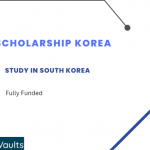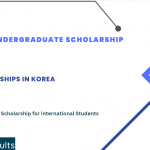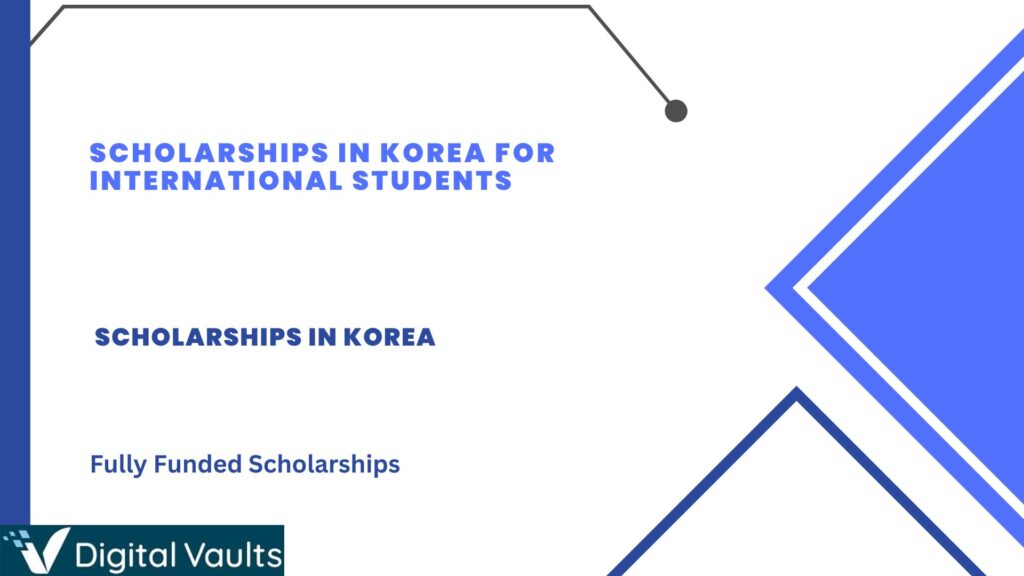Global Korea Scholarships GKS 2024-2025 : Fully Funded ScholarshipJuly 22, 2024 by Digital Vaults Editorial Team
GKS Summary
Country of Origin: Korea
Supported by: Government of Korea
Level of Education: Bachelor’s Degree, Associate Degree
GKS-U Time Frame:
- Scholarship for 5 to 7 years of Bachelor’s Degree (Korean language program for 1 year)
- Scholarship for 3 to 4 years of Associate Degree (Korean language program for 1 year)
The number of GKS Scholarships available: International Students Can Apply for 200 Undergraduate Scholarships in Korea.
Deadline: Deadline depends on track and will be set by each Korean embassy and university. Refer this.
Embassy: Set by each embassy
University: Set by each university but not earlier than October 21 .
Official website: https://www.studyinkorea.go.kr/ko/main.do?message=
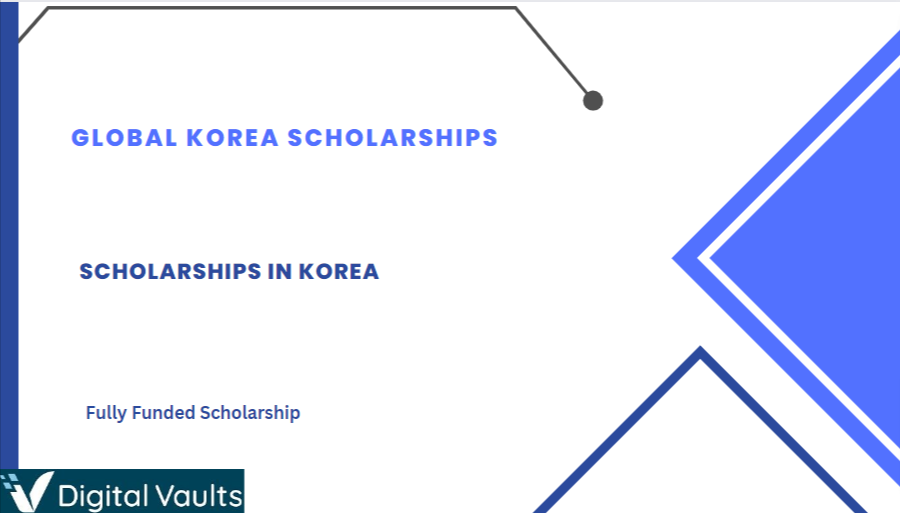
Full list of scholarship in Korea
Objective
Global Korea Scholarship GKS, previously known as the Korean Government Scholarship Program (KGSP), is a Korean Government Scholarship Program for international students. This Global Korea Scholarship for Undergraduate Degrees aims to develop friendships between Korea and other nations. The goal of this program is to give overseas students the chance to pursue advanced studies in undergraduate and graduate programs in South Korean higher education institutions. This scholarship program is one of the largest and most competitive in the world.
Eligibility Criteria of the GKS
Nationality: All candidates must be citizens of one of the NIIED-designated nations (India, Pakistan, Bangladesh, etc) that have been invited to take part in the GKS program.
Level of Education:
- Bachelors degree program is for applicants who graduated (or are expected to graduate) from a high school or from an associate degree program.
- The associate degree program is for applicants who graduated (or are expected to graduate) from a high school
Grades:
You must have good grades. The CGPA of the prior program must fulfill one of the two standards listed below.
You should be in the top 20% of your own class.
or
The CGPA must be 2.64/4.0, 2.80/4.3, 2.91/4.5, or 3.23/5.0.
No Criminal Background: All candidates must have no disqualifying factors (such as a criminal record) for international travel.
Health: Applicants must be in good mental and physical health to study in Korea.
If an applicant fails a drug test or has a significant illness, they may be disqualified.
All second-round applicants must submit a doctor or hospital-issued examination certificate.
If a GKS scholar is found to have a significant illness during the final medical exam conducted by NIIED after landing in Korea, he will be disqualified.
What Universities and Fields of Study are available?
- All fields of study, offered by participating universities are eligible for this scholarship.
- Part-time or short-term studies, as well as online or distance learning programs, are not eligible for this award.
- Applicants can only apply to the universities and departments that are listed in the „University Information‟ file attached under the GKS Notice post in Study in Korea website (studyinkorea.go.kr > Scholarships > GKS Notice)
GKS Scholarship Benefits
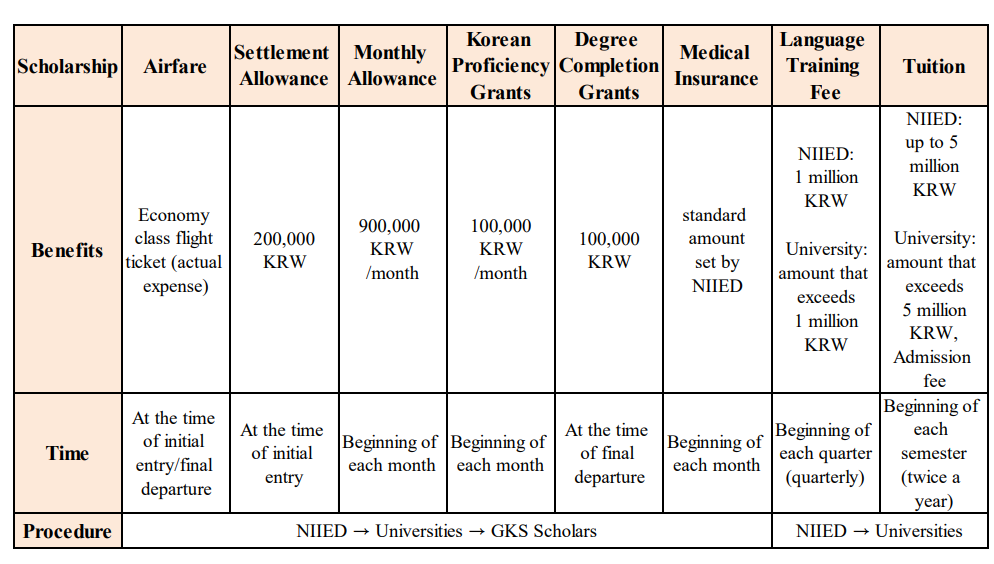
How to Apply for GKS Scholarship as International Student?
Applicants may apply using one of the two methods listed below:
1)University Track: Candidates applying through University Track must apply directly to the university. The university will propose you as a 2023 GKS candidate and will forward your nomination to the NIIED since the ultimate decision will be made by the NIIED.
Program Quota:
University-Industry Cooperation (UIC) Program: 55 scholars
Regional Universities and Associate Degree Program: 64 scholars
○ General: 74 scholars from 67 countries
○ Overseas Koreans: 7 scholars from 7 countries
2) Embassy Track: Candidates for Embassy Track must apply through the South Korean Embassy in their home countries. The embassy will choose the applicant and ask the candidate to apply to some institution, which will nominate you as their GKS candidate and send the nomination to the NIIED. Again, NIIED will make the ultimate selection.
Program Quota
○ General: 74 scholars from 67 countries
○ Overseas Koreans: 7 scholars from 7 countries
GKS Selection Schedule
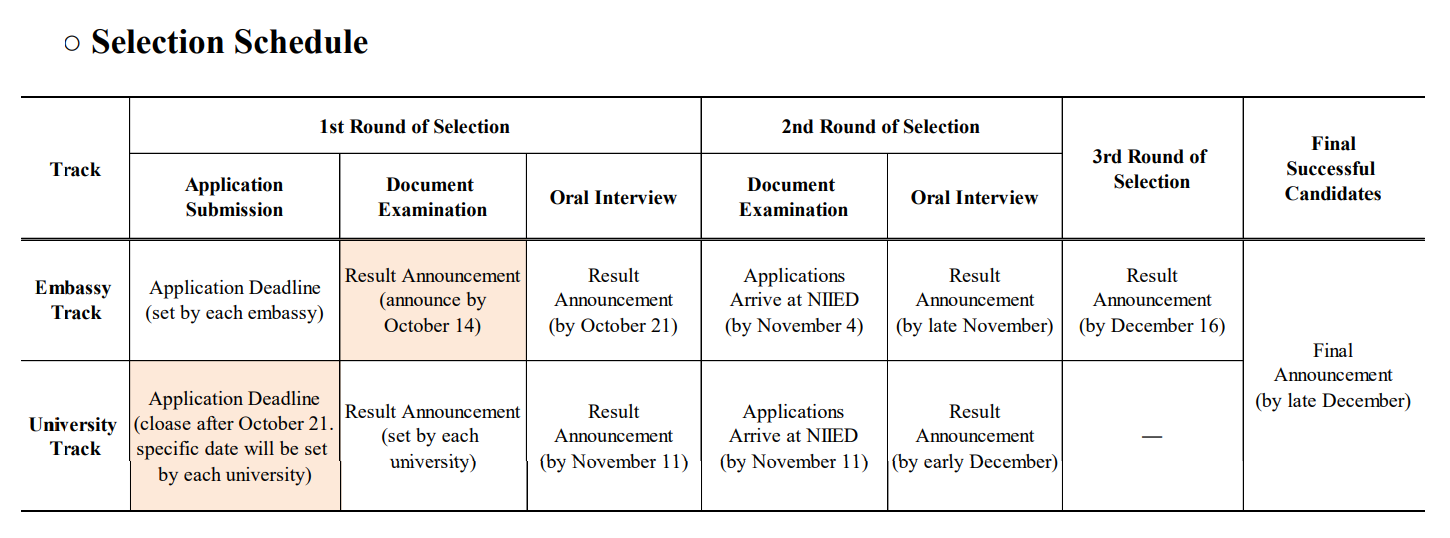
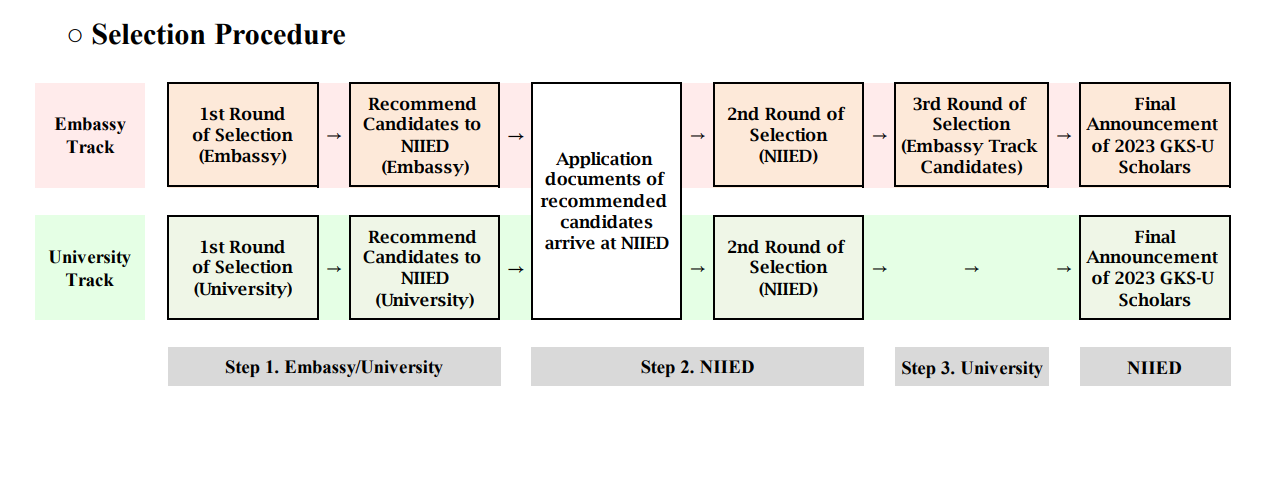 Required Documents for GKS Application
Required Documents for GKS Application
- Application Form
- Personal Statement
- Letter of Recommendation
- Study Plan
- GKS Applicant Agreement
- Personal Medical Assessment
- Proof of citizenship (applicant and parents) and proof of family relationship
- High School Graduation Certificate (or certificate of expected graduation)
- Academic transcript of the high school curriculum
- Graduation certificate (or certificate of expected graduation) of associate
- Degree program
- Academic transcript of associate degree
- Proof of Overseas Korean Document
- Proof of Korean Citizenship Renunciation Document
- Proof of Korean War Veteran’s Descendant
- Score report of valid TOPIK (original) or English Proficiency Test (copy) Optional
- Copy of awards and other certificates, etc. (copy) Optional
- Applicant’s Passport (copy)
Official Website
NIIED: [email protected]
GKS Center, NIIED (Selection department of 2024GKS-U) 191, Jeongjail-ro, Bundang-gu, Seongnam-si, Gyeonggi-do (13557) Republic of Korea
FAQs
Can GKS students work?
Working without the approval of the immigration office is termed unlawful employment. Exchange/visiting students must finish one semester before applying for a part-time employment.
Is IELTS required for GKS scholarship?
This scholarship does not need IELTS or TOEFL. Your language of teaching, however, will be English.
Which universities in Korea come under GKS?
| For Embassy Track | For University Track Applicants |
| Ajou University | Busan University of Foreign Studies |
| Dongguk University | Chungnam National University |
| Duksung Women’s University | Chonnam National University |
| Ewha Womans University | Daegu University |
| Hanyang University (Seoul) | Daejeon University |
| Konkuk University | Dongseo University |
| Kookmin University | Handong Global University |
| Korea Polytechnic University | Hannam University |
| Korea University | Inje University |
| Kyung Hee University | Jeju National University |
| Seoul National University | Kangwon National University |
| Seoul National University of Science and Technology | Keimyung University |
| Sookmyung Women’s University | Kongju National University |
| Sungkyunkwan University | Konyang University |
| Yonsei University | Kyungpook National University |
| Busan University of Foreign Studies | National Korea Maritime & Ocean University |
| Chungnam National University | Pai Chai University |
| Chonnam National University | Pukyong National University |
| Daegu University | Pusan National University |
| Daejeon University | Semyung University |
| Dongseo University | Silla University |
| Handong Global University | Soonchunhyang University |
| Hannam University | Sun Moon University |
| Inje University | Sunchon National University |
Which countries are eligible for GKS?
| Embassy Track | University Track |
| Afghanistan | Afghanistan |
| Angola | Angola |
| Azerbaijan | Azerbaijan |
| Bangladesh | Bangladesh |
| Bhutan | Bhutan |
| Bolivia | Bolivia |
| Brazil | Brazil |
| Brunei | Brunei |
| Bulgaria | Bulgaria |
| Cambodia | Cambodia |
| Canada | Canada |
| Chile | Chile |
| Colombia | Colombia |
| Dominican Republic | Dominican Republic |
| D R Congo | D R Congo |
| Ecuador | Ecuador |
| Egypt | Egypt |
| El Salvador | El Salvador |
| Equatorial Guinea | Equatorial Guinea |
| Ethiopia | Ethiopia |
| Fiji | Fiji |
| Gabon | Gabon |
| Ghana | Ghana |
| Guatemala | Mexico |
| India | Mongolia |
| Indonesia | Morocco |
| Iran | Mozambique |
| Japan | Myanmar |
| Jordan | Nepal |
| Kazakhstan | Nigeria |
| Kenya | Pakistan |
| Kyrgyz Republic | Russia |
| Laos | Rwanda |
| Malaysia | Singapore |
| Mexico | Sri Lanka |
| Mongolia | Sudan |
| Morocco | Sweden |
| Mozambique | Tajikistan |
| Myanmar | Tanzania |
| Nepal | Thailand |
| Nigeria | Uzbekistan |
| Pakistan | Venezuela |
| Panama | Vietnam |
| Paraguay | Yemen |
| Peru | |
| Philippines | |
| Poland | |
| Russia | |
| Rwanda | |
| Singapore | |
| Sri Lanka | |
| Sudan | |
| Sweden | |
| Tajikistan | |
| Tanzania | |
| Thailand | |
| Timor-Leste | |
| Trinidadand Tobago | |
| Turkey | |
| Turkmenistan | |
| Uganda | |
| Ukraine | |
| Uruguay | |
| Uzbekistan | |
| Venezuela | |
| Vietnam | |
| Yemen |

